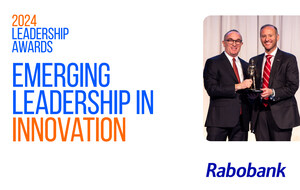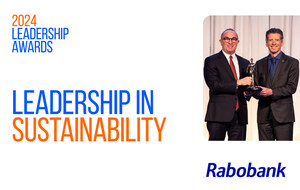Rabobank Report: Agflation To Hit Animal Protein And Dairy Industries, Drive Food Prices Up 15%
Agflation Sustained and Kinder to Developing Economies vs. 2008 - But Threat of Government Intervention Looms
NEW YORK, Sept. 20, 2012 /PRNewswire/ -- Rabobank has published a new report looking at the impact of the drought on the food and agriculture industry, and its ultimate implications for rising food prices.
In the report, Rabobank's Food & Agribusiness Research and Advisory group says that skyrocketing agricultural commodity prices are causing the world to re-enter a period of "agflation" with food prices forecast to reach record highs in 2013, and continuing to rise well into Q3 2013. Unlike the staple grain shortage in 2008, this year's scarcity will affect feed intensive crops with serious repercussions for the animal protein and dairy industries.
Reduced Impact on Poor Consumers vs. 2008
Luke Chandler, Global Head of Agri Commodity Markets Research at Rabobank, commented, "The impact on the poorest consumers should be reduced this time around, as purchasers are able to switch consumption from animal protein back towards staple grains like rice and wheat. These commodities are currently 30% cheaper than their 2008 peaks. Nonetheless, price rises are likely to stall the long-term trend towards higher protein diets in Asia, the Middle East, and North Africa. In developed economies – especially the U.S. and Europe – where meat and corn price elasticity is low, the knock-on effect of high grain prices will be felt for some time to come."
Due to the long production cycles of the animal protein and dairy industries, the effects of grains shortages will be more sustained because herds (especially cattle) take longer to rebuild, maintaining upward pressure on food prices. However, food makes up a smaller proportion of budget spend in such countries, so the current period of agflation should not lead to the unrest witnessed in response to the 2008 shortages.
Food Prices to Rise 15% by June 2013
Rabobank estimates that the Food and Agricultural Organisation (FAO) Food Price Index will rise by 15% by the end of June 2013. In order for demand rationing to take place, in turn encouraging a supply response, prices will need to stay high. As such, Rabobank expects prices – particularly for grains and oilseeds – to remain at elevated levels for at least the next 12 months.
Government Intervention
While the impact of higher food prices should be reduced by favorable macroeconomic fundamentals (low growth, lower oil prices, weak consumer confidence, and a depreciated U.S. dollar), interventionist government policies could exacerbate the issue. Stockpiling and export bans are a distinct possibility in 2012/13, as governments seek to protect domestic consumers from increasing food prices. Increased government intervention will likely encourage further increases in world commodity and food prices.
Rabobank expects that localized efforts to increase stockpiles will prove counterproductive at the global level, with those countries least able to pay higher prices likely to see greater moves in domestic food price inflation. This is a vicious circle, with governments committing to domestic stockpiling and other interventionist measures earlier than usual—recognizing the risk of being left out as exportable stocks decline further.
On top of that, Rabobank warns that global food stocks have not been replenished since 2008, leaving the market without any buffer to adverse growing conditions. Efforts by governments to rebuild stocks are likely to add to food prices and take supplies off the market at a time when they are most needed.
Background
Current price inflation is the result of weather driven events in large exporting nations, principally a severe drought in the U.S. (its worst since 1936) and similar water shortages in Russia and South America. The rally in grain and oilseed prices will have a significant knock-on effect on other F&A supply chains, especially the animal protein industry, resulting in rising meat prices.
A copy of the Rabobank report on "Agflation" is available to media upon request.
Rabobank Group is a global financial services leader providing wholesale and retail banking, asset management, leasing, real estate services, and renewable energy project financing. Founded over a century ago, Rabobank is one of the largest banks in the world, with nearly $1 trillion in assets and operations in more than 40 countries, and is among the highest rated private banks by S&P and Moody's. Internationally Rabobank focuses on food and agriculture and in North America it is a premier bank to the food, beverage and agribusiness industry. Rabobank's Food & Agribusiness Research and Advisory team is comprised of more than 80 analysts around the world who provide expert analysis, insight and counsel to Rabobank clients about trends, issues and developments in all major sectors of agriculture. www.Rabobank.com
SOURCE Rabobank
WANT YOUR COMPANY'S NEWS FEATURED ON PRNEWSWIRE.COM?
Newsrooms &
Influencers
Digital Media
Outlets
Journalists
Opted In






Share this article